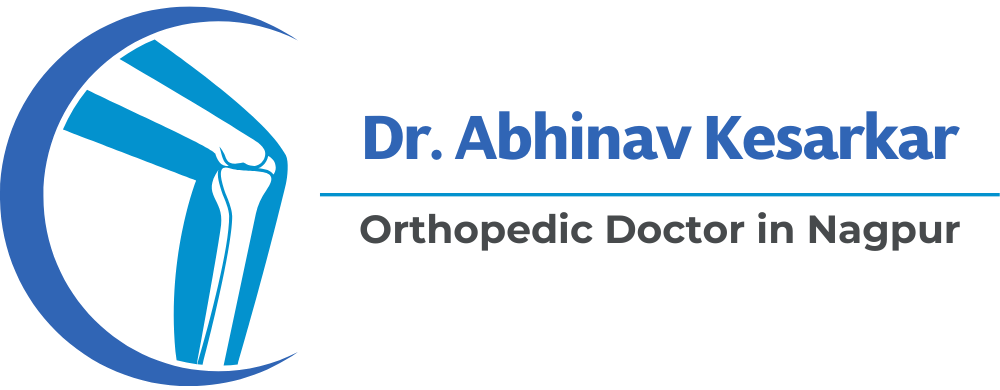Dr. Abhinav Kesarkar | Orthopedic Surgeon In Nagpur
Best orthopedic surgeon in Rewa

Best orthopedic surgeon
A highly skilled and experienced surgeon who performs procedures related to the bones, joints, spine, and soft tissues. They could specialize in specific areas like joint replacement (knee, hip, etc.), spine surgery, or sports medicine
A medical center with excellent facilities, cutting-edge technology, and a team of expert orthopedic doctors and surgeons.
Who is an orthopedic surgeon?
An orthopedic surgeon is a doctor who helps people move better and live with less pain by treating bone and joint issues—sometimes with surgery, and often without.
An orthopedic surgeon is a medical doctor (MD or DO) who specializes in treating injuries and disorders of the musculoskeletal system, which includes.
- Bones
- Joints
- Muscles
- Tendons
- Ligaments
- Nerves
What does an orthopedic surgeon ?
1. Diagnose Problems:-
- They find out what’s causing pain or difficulty moving by:
- Examining the body
- Ordering and reviewing tests (X-rays, MRIs, CT scans, blood work)
- Asking about symptoms and medical history
2. Provide Non-Surgical Treatment
- Not all orthopedic problems require surgery. They often treat with:
- Medications (e.g. pain relievers, anti-inflammatories)
- Physical therapy
- Braces or splints
- Joint or steroid injections
- Activity modification or lifestyle advice
3. Perform Surgeries When Needed
- Joint replacement (hip, knee, shoulder)
- Arthroscopy (minimally invasive surgery using a camera)
- Fracture repair (plates, screws, or rods for broken bones)
- Spine surgery (for herniated discs or spinal deformities)
- Ligament and tendon repair (e.g., ACL reconstruction)
4. Rehabilitation and Follow-Up
- After treatment or surgery, they:
- Monitor healing
- Recommend exercises or physical therapy
Reasons to see an orthopedic surgeon?
1. Persistent Joint or Bone Pain
- Pain in the knee, hip, shoulder, back, or neck that doesn’t improve with rest or over-the-counter meds
2. Difficulty Moving or Loss of Mobility
- Trouble walking, bending, lifting, or using a limb
- Stiff joints or decreased range of motion
- Pain while climbing stairs, standing, or reaching
3. Injury From Accidents or Sports
- Broken bones (fractures)
- Dislocated joints
- Torn ligaments (like an ACL tear)
- Tendon injuries (like a rotator cuff tear)
4. Swelling, Numbness, or Tingling
- Swelling in joints or limbs without clear cause
- Numbness or tingling in arms, legs, hands, or feet (can signal nerve compression or injury)
5. Chronic Conditions
- Arthritis (osteoarthritis, rheumatoid arthritis)
- Osteoporosis (bone thinning)
- Scoliosis or other spine deformities
- Carpal tunnel syndrome
- 6. Failed Previous Treatments
When physical therapy, medication, or injections haven’t helpe
What to Expect During Your Orthopedic Appointment in Rewa
1. Before Your Appointment
To make the most of your visit, please prepare:
Your Medical History – Details of any past injuries, surgeries, or existing health conditions.
A List of Medications – Include all prescriptions, over-the-counter medicines, and supplements.
Imaging Reports – Bring any X-rays, MRIs, or CT scans you have already done.
Notes on Your Symptoms – When they began, what makes them better or worse, and how they affect your daily activities.
2. During Your Appointment
✅ Medical History Review
The doctor will discuss your symptoms in detail, such as pain, swelling, numbness, or weakness, and review any past injuries, surgeries, or chronic conditions.
✅ Physical Examination
Your affected area will be examined to check movement, joint strength, swelling, and flexibility. The doctor will also observe how you walk, stand, or move to assess overall function.
✅ Diagnostic Tests
If needed, the doctor may order or review X-rays, MRI, or CT scans to get a clearer picture of your condition. Additional tests, such as blood work or nerve studies, may also be done if necessary.
3. Discussion and Diagnosis
Once the examination and tests are done, the doctor will:
Explain what is causing your symptoms.
Discuss treatment options, which may include:
Non-Surgical Treatments: such as physical therapy, medications, braces, or injections.
Surgical Treatments: if your condition is severe or does not improve with non-surgical care.
4. Your Treatment Plan
Finally, you will receive a customized care plan, which includes:
Clear instructions on your next steps.
Referrals to other specialists if needed, like a physiotherapist.
Guidance on exercises, lifestyle changes, or follow-up appointments to support your recovery.Contact Now

